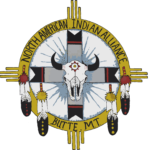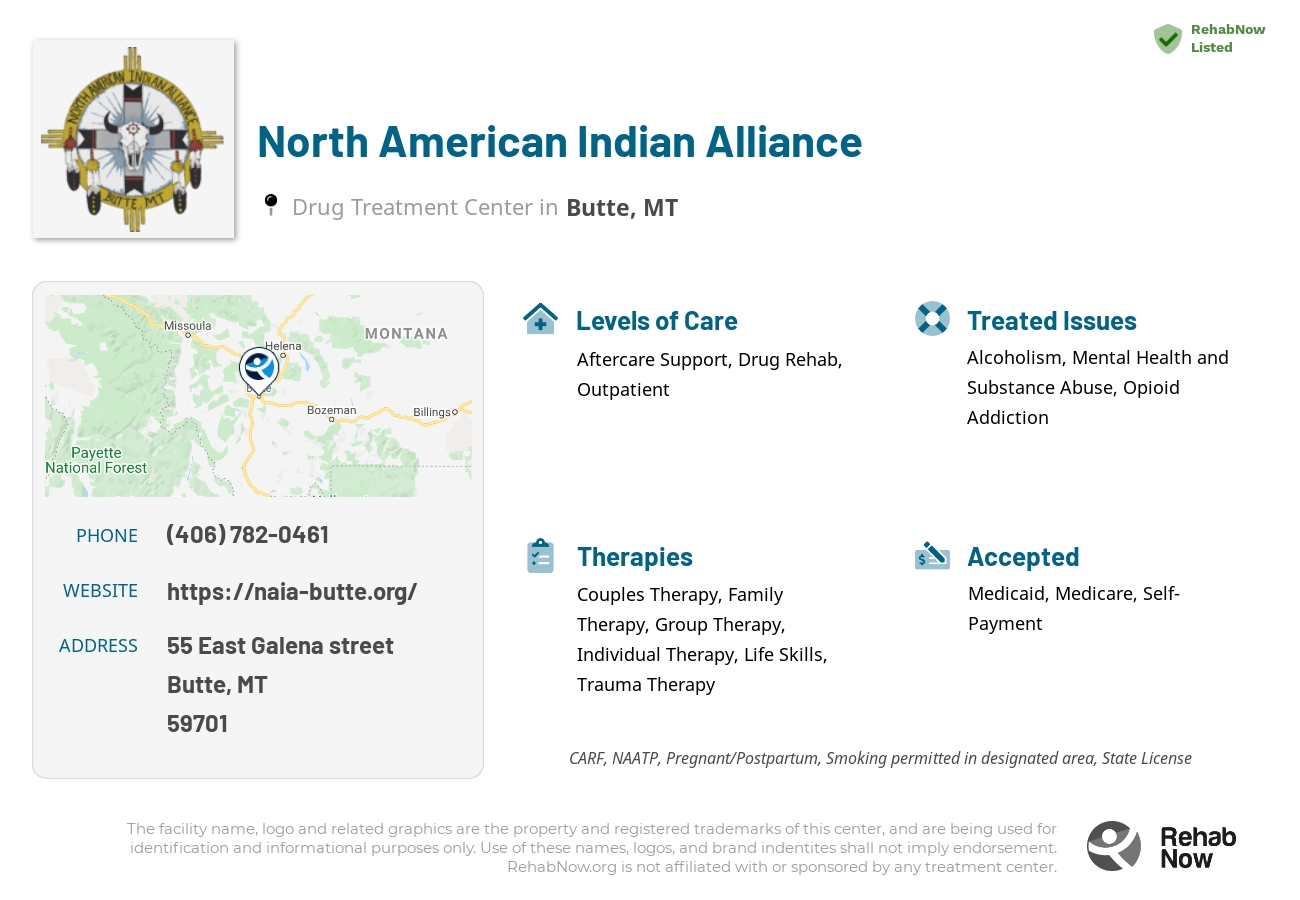North American Indian Alliance
Drug Rehab Center in Butte, Montana
North American Indian Alliance (NAIA) in Butte, Montana, is an addiction treatment facility offering specialized care for alcoholism, dual diagnosis, opioid addiction, and other drug addiction disorders, including aftercare support, drug rehab, outpatient care, and various therapies and services, with accreditation from CARF and a license from the State of Montana.
About North American Indian Alliance in Montana
North American Indian Alliance (NAIA) is an addiction treatment facility located in Butte, Montana. This facility offers specialized care for individuals living with alcoholism, dual diagnosis, opioid addiction, and other drug addiction disorders. Their team of experienced and knowledgeable addiction treatment professionals provide a compassionate and therapeutic approach to help individuals address and overcome addiction. To provide comprehensive and individualized care, NAIA offers a range of services including aftercare support, drug rehab, and various levels of outpatient care.
At North American Indian Alliance, patients are provided with a personalized and comprehensive treatment plan to ensure the best possible outcome. The program provides a variety of therapies and services to support individuals in their recovery journey, such as group and individual counseling, educational and relapse prevention classes, and 12-step program coordination. To ensure the highest standard of care, NAIA has attained accreditation from the Commission on Accreditation of Rehabilitation Facilities (CARF) and holds a license from the State of Montana.
Genders
Ages
Modality
Additional
Conditions and Issues Treated
Opioids are a group of drugs that include substances such as heroin, morphine, and oxycodone. These drugs activate opioid receptors in the brain, which produce pleasurable feelings. Opioid addiction occurs when drugs are abused at increasing rates or increasing amounts because the body becomes tolerant of them.
Opioid addiction is typically diagnosed when drug abuse becomes a typical behavior that interferes with an individual’s ability to function daily. The use of the substance results in consequences like legal problems.
Treatment for opioid addiction varies depending on each individual’s needs. Some treatments focus on replacing opioids with other drugs that have similar effects of reducing withdrawal symptoms. Other treatments aim to reduce the risk of relapse by providing psychological support or using more natural methods.
Levels of Care Offered
This center offers a variety of custom treatment tailored to individual recovery. Currently available are Aftercare Support, Drug Rehab, Outpatient, with additional therapies available as listed below.
Outpatient programs offer a lower intensity level of addiction treatment than inpatient facilities. They are ideal for those who have graduated from inpatient facilities, have a supportive home environment, and are motivated to commit to the program. Services offered include medication-assisted treatment, individual and group therapy, and peer group support.
This treatment is a popular option for those suffering from a lower intensity addiction. It is not advisable for someone who needs to go through a medically supervised detox or does not have a supportive home environment. It requires motivation and dedication to commit to the program without constant monitoring.
Aftercare Support in drug rehab is crucial because it helps people stay sober after treatment. Aftercare Support in drug rehab is helpful because it provides the recovering person with a support group, including family members, friends, and other peers who are also in recovery.
The benefits of Aftercare Support are that it provides a pathway that will help people get sober for life. It supports healing at all levels, physical, mental, emotional, and spiritual. Another benefit of Aftercare Support is that participants learn to maintain their sobriety through holistic methods. They learn to modify behaviors individually to have peace of mind, have positive relationships with others, and find peace on the inside.
Therapies & Programs
During individual therapy at North American Indian Alliance in , the person in recovery meets with a therapist one on one to go over their situation and learn from past mistakes. The counselor or therapist will use this time to address the causes of addiction, triggers, and any mental issue or dual diagnosis. They will also address aftercare plans, giving them the best chances of long-term sobriety.
This therapeutic process is very intense and challenging to go through. Some clients may find it easier to open up with someone apart from their family or loved ones who understand their struggles and experience with addiction.
The process of going through couple’s therapy at North American Indian Alliance in allows for both partners to be on the same page regarding addiction recovery. Whether one or both members of the couple struggled with addiction, they can improve their odds of sobriety by undergoing this treatment together. This therapeutic environment teaches how to communicate effectively and avoid relapse triggers while building healthy lifestyles that may help maintain sobriety following graduation from rehab programs.
Family therapy is designed to help addicts get clean and sober by using what they love the most; their family. Most drug treatment centers make it mandatory that the addict’s family attend therapy sessions, which is great because having everyone there to support them makes it much easier for them to get clean. Not only are they surrounded by people who want them to get better, but everyone is there because they want the best for them, not because they feel like they have to be.
Drug addicts are often surrounded by resentful or uneducated family members who would, at times, rather see them stay addicted because it makes their own lives easier. Sometimes they don’t understand what the addiction is or how they play a part in it. They know that during and after the addict’s sobriety journey, they will face challenges and changes that they aren’t sure how to handle. This can be very tough for an addict to go through on their own, which is why it’s so important that they have the support of their family. Just because someone is an addict does not mean that they don’t deserve the love and support of those around them.
Addicts in Butte, MT can find support in group therapy at North American Indian Alliance by finding peers who understand their situation and being held accountable. They also learn to develop faith, understanding, and insight into their addiction through shared conversations.
Group Therapy is employed by drug treatment centers to provide the recovering addict with a platform to talk about their feelings and experiences. It also provides for an opportunity to learn from other addicts who have successfully overcome their addiction. It is recommended that all group members be recovering addicts for this type of therapy to work.
Trauma therapy allows people who struggled with a past trauma to face the situation and learn from it. Many people go through traumatic events at an early age that later leads them into addiction as adults. By addressing this issue during treatment at North American Indian Alliance in [/type], you can move forward with your recovery process and take back control of your sober future, too!
Traumas are one of the most common causes of psychological disorders such as Addiction Disorder. It’s often found among those diagnosed with Addictive Disorders because traumatized individuals have strong emotions or thoughts related to their traumas, leading to addictive behaviors.
Many people who struggle with addiction in Butte, Montana also have trouble managing their daily responsibilities after treatment. With this type of therapy, addicts are taught how to manage their time, attain specific goals, and take care of all facets of their lives without the influence of drugs or alcohol.
During these sessions, therapists will work with addicts to identify personal values and goals. They will then help addicts set goals for achieving those values and standards. In the process, therapists help addicts develop strategies for fulfilling their goals and successfully managing their responsibilities.
In many cases, this type of therapy is used in conjunction with other types of addiction treatment services to address specific issues that affect a recovering addict’s ability to stay sober.
Payment Options Accepted
For specific insurance or payment methods please contact us.
Additional Details
Specifics, location, and helpful extra information.
Butte, Montana 59701 Phone Number(406) 782-0461 Meta DetailsUpdated November 25, 2023
Staff Verified
North American Indian Alliance Patient Reviews
There are no reviews yet. Be the first one to write one.
Butte, Montana Addiction Information
Montana has one of the highest rates of drug and alcohol abuse in the nation. More than 280,000 of its residents engage in drug or alcohol abuse every year. Marijuana, in particular, is heavily used among high school students. Despite these daunting trends, the state is grappling with the issue head-on.
Drug addiction is a serious problem in Butte, Montana. In Butte specifically, in 2015, there were 3 overdoses due to opioids and 11 overdoses due to other drugs. From 2015 to 2016, the number of opioid prescriptions increased by 18%. There are many drug and alcohol treatment programs in Butte that can help you recover from addiction, and there are also many support groups and sober living homes available.
Treatment in Nearby Cities
- Colstrip, MT (284.3 mi.)
- Plentywood, MT (419.1 mi.)
- Fort Benton, MT (154.0 mi.)
- Missoula, MT (91.5 mi.)
- Columbus, MT (160.4 mi.)
Centers near North American Indian Alliance
The facility name, logo and brand are the property and registered trademarks of North American Indian Alliance, and are being used for identification and informational purposes only. Use of these names, logos and brands shall not imply endorsement. RehabNow.org is not affiliated with or sponsored by North American Indian Alliance.


